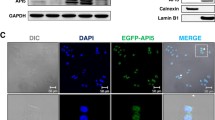Abstract
Recently, the role of anti-apoptotic Mcl-1 in human carcinogenesis has become an area of great interest as overexpression of the protein has been reported in association with various types of cancer. The aim of this study was to investigate the expression profile of Mcl-1 in cervical cancer and to assess its clinical significance. Immunohistochemistry was used in the detection of Mcl-1 expression as well as the proliferation index of Ki-67, both in cervical cancer and in corresponding normal tissue. Western blotting analysis was also used for the detection of Mcl-1. The data was correlated with clinicopathological features. Survival analysis was performed to assess prognostic significance. Mcl-1 was overexpressed in cervical cancer tissue when compared with corresponding normal tissue. High expression of Mcl-1 was significantly associated with histological grade (P = 0.039), tumor size (P = 0.024) and lymph node involvement (P = 0.002). Overexpression of Ki-67 was associated with lymph node involvement (P = 0.015) and disease stage (P = 0.012). Spearman rank correlation test demonstrated a positive correlation between Mcl-1 and Ki-67 (P < 0.05). Using Kaplan–Meier analysis, a comparison of survival curves of low versus high expressers of Mcl-1 and Ki-67 revealed a highly significant difference in human cervical cancer tissue (P < 0.05), which suggests that overexpression of Mcl-1 and Ki-67 is associated with a poorer prognosis. Our results suggest that Mcl-1 may play an important role in cervical cancer and that it may have potential as a biomarker and therapeutic target. Its evaluation with Ki-67 may provide reliable prognostic information on cervical cancer.




Similar content being viewed by others
References
Hu X, Schwarz JK, Lewis JS Jr, et al. A microRNA expression signature for cervical cancer prognosis. Cancer Res. 2010;70:1441–8.
O’Meara AT. Present standards for cervical cancer screening. Curr Opin Oncol. 2002;14:505–11.
Martin CM, Astbury K, O’Leary JJ. Molecular profiling of cervical neoplasia. Expert Rev Mol Diagn. 2006;6:217–29.
Clohessy JG, Zhuang J, de Boer J, et al. Mcl-1 interacts with truncated Bid and inhibits its induction of cytochrome c release and its role in receptor-mediated apoptosis. J Biol Chem. 2006;281:5750–9.
Cuconati A, Mukherjee C, Perez D, et al. DNA damage response and MCL-1 destruction initiate apoptosis in adenovirus-infected cells. Genes Dev. 2003;17:2922–32.
Shimazu T, Degenhardt K, Nur-E-Kamal A, et al. NBK/BIK antagonizes MCL-1 and BCL-XL and activates BAK-mediated apoptosis in response to protein synthesis inhibition. Genes Dev. 2007;21:929–41.
Sieghart W, Losert D, Strommer S, et al. Mcl-1 overexpression in hepatocellular carcinoma: a potential target for antisense therapy. J Hepatol. 2006;44:151–7.
Khoury JD, Medeiros LJ, Rassidakis GZ, et al. Expression of Mcl-1 in mantle cell lymphoma is associated with high-grade morphology, a high proliferative state and p53 overexpression. J Pathol. 2003;199:90–7.
Inagawa S, Itabashi M, Adachi S, et al. Expression and prognostic roles of beta catenin in hepatocellular carcinoma: correlation with tumor progression and postoperative survival. Clin Cancer Res. 2002;8:450–6.
Cotran RS, Kumar V, Collins T. Cellular injury and cell death. In: Robbins pathologic basis of disease. 7th edn. Philadelphia: Elsevier Saunders; 2004.
Adams JM, Cory S. The Bcl-2 protein family: arbiters of cell survival. Science. 1998;281:1322–6.
Akgul C, Turner PC, White MR, et al. Functional analysis of the human MCL-1 gene. Cell Mol Life Sci. 2000;57:684–91.
Schubert KM, Duronio V. Distinct roles for extracellular-signal regulated protein kinase (ERK) mitogen-activated protein kinases and phosphatidylinositol 3-kinase in the regulation of Mcl-1 synthesis. Biochem J. 2001;356:473–80.
Leuenroth SJ, Grutkoski PS, Ayala A, et al. The loss of Mcl-1 expression in human polymorphonuclear leukocytes promotes apoptosis. J Leukoc Biol. 2000;68:158–66.
Willis SN, Chen L, Dewson G, et al. Proapoptotic Bak is sequestered by Mcl-1 and Bcl-xL, but not Bcl-2, until displaced by BH3-only proteins. Genes Dev. 2005;19:1294–305.
Cho-Vega JH, Rassidakis GZ, Admirand JH, et al. MCL-1 expression in B-cell non-Hodgkin’s lymphomas. Hum Pathol. 2004;35:1095–100.
Allen TD, Zhu CQ, Jones KD, et al. Interaction between MYC and MCL1 in the genesis and outcome of non-small-cell lung cancer. Cancer Res. 2011;71:2212–21.
Schulze-Bergkamen H, Ehrenberg R, Hickmann L, et al. Bcl-x(L) and Myeloid cell leukaemia-1 contribute to apoptosis resistance of colorectal cancer cells. World J Gastroenterol. 2008;14:3829–40.
Xiang Z, Luo H, Payton JE, Cain J, Ley TJ, Opferman JT, Tomasson MH. Mcl-1 haploinsufficiency protects mice from Myc-induced acute myeloid Leukemia. J Clin Invest. 2010;120:2109–18.
Andersson Y, Juell S. Fodstad. Downregulation of the antiapoptotic MCL-1 protein and apoptosis in MA-11 breast cancer cells induced by an anti-epidermal growth factor receptor-Pseudomonas exotoxin a immunotoxin. Int J Cancer. 2004;112:475–83.
Akgul C. Mcl-1 is a potential therapeutic target in multiple types of cancer. Cell Mol Life Sci. 2009;66:1326–36.
Mann CD, Neal CP, Garcea G, et al. Prognostic molecular markers in hepatocellular carcinoma: a systematic review. Eur J Cancer. 2007;43:979–92.
Acknowledgments
This work was supported by the Nanjing Medical University Science and Technology Development Fund (08NMUM080), and Wuxi Bureau of Science and Technology Medical Technology Development Fund(CSE00949). The authors have no conflict of interest to declare.
Author information
Authors and Affiliations
Corresponding author
Additional information
Ting Zhang and Chun Zhao authors contributed equally to this work.
Rights and permissions
About this article
Cite this article
Zhang, T., Zhao, C., Luo, L. et al. The expression of Mcl-1 in human cervical cancer and its clinical significance. Med Oncol 29, 1985–1991 (2012). https://doi.org/10.1007/s12032-011-0005-y
Received:
Accepted:
Published:
Issue Date:
DOI: https://doi.org/10.1007/s12032-011-0005-y




